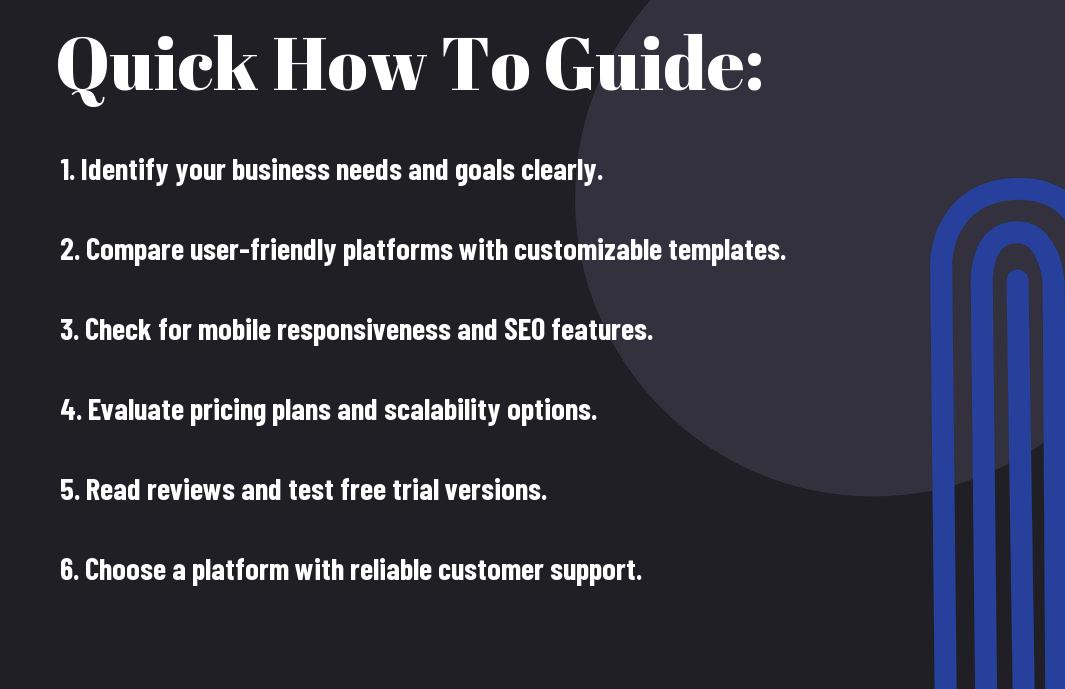Over the years, choosing the right website builder has become crucial for small businesses aiming to establish a strong online presence. In this guide, you’ll discover the key factors to consider, such as user-friendliness, customization options, and pricing, to help you avoid common pitfalls that could hinder your success. With the right tools at your disposal, you can create a website that not only showcases your brand effectively but also drives customer engagement and boosts sales. Let’s dive in and make this selection process manageable and rewarding for your business.
Key Takeaways:
- Identify your specific business needs and goals to choose a website builder that aligns with your objectives.
- Evaluate ease of use, customization options, and scalability to ensure the platform can grow with your business.
- Consider budget constraints and compare pricing plans, including any additional costs for features you may need.

Understanding Website Builders
Your choice of a website builder can significantly impact your online presence. With countless options available, it’s important to understand the basics of what a website builder is and the types available. This knowledge will empower you to select a platform that aligns with your business goals and technical skills, making your website both functional and appealing.
What is a Website Builder?
Website builders are tools that assist users in creating websites without the need for extensive coding skills. They offer intuitive interfaces and pre-designed templates, enabling you to easily customize your site. These platforms provide you with a comprehensive solution to bring your business online quickly and efficiently.
Types of Website Builders
Website builders can generally be categorized into a few types based on their functionality and features:
- Drag-and-Drop Builders: User-friendly interfaces for non-tech-savvy users.
- Content Management Systems (CMS): More flexible, ideal for larger websites.
- E-commerce Builders: Designed specifically for online stores.
- Static Website Generators: Requires technical skills but offers high speed.
- Custom Solutions: Tailored to precise business needs, often requiring developers.
After understanding these types, you can assess which one suits your specific requirements the best.
| Type | Features |
| Drag-and-Drop Builders | User-friendly, customizable templates, good for beginners. |
| Content Management Systems (CMS) | Advanced features, scalability, ideal for blogs and portfolios. |
| E-commerce Builders | Payment gateways, product management, sales analytics. |
| Static Website Generators | Fast loading, requires coding, suitable for developers. |
| Custom Solutions | Tailored designs, needs skilled developers, potentially more expensive. |
Understanding the various types of website builders will help you make a well-informed decision. Assessing how each type aligns with your business needs is integral. Below is a breakdown of types:
- Drag-and-Drop Builders: Simplistic, ideal for quick setups.
- Content Management Systems (CMS): Versatile, suitable for growing businesses.
- E-commerce Builders: Essential for anyone looking to sell online.
- Static Website Generators: High performance, for tech-savvy users.
- Custom Solutions: Complete control, requires investment in development.
After considering these factors, you’ll be better equipped to choose a website builder that meets your aspirations.
Key Factors to Consider
Assuming you’re ready to build your small business website, there are several key factors to consider. Focus on the following:
- Budget, including hidden fees
- Design flexibility for your brand
- Ease of use for your skill level
- Customer support options available
- Integration capabilities with other tools
The right builder will effectively meet your business needs.
Budget and Pricing Options
Options vary widely depending on the website builder you choose. Some platforms offer free basic plans, while others charge monthly or yearly fees that can add up. Be sure to analyze what features you need versus what you’re willing to spend. Prioritizing value over price is crucial as hidden costs can easily sneak up on you.
Features and Functionality
The functionality of your website builder greatly impacts your site’s performance. Key features to consider include customizable templates, e-commerce capabilities, SEO tools, and mobile responsiveness. These elements not only enhance user experience but also affect your site’s searchability and attractiveness to customers.
To enhance your website’s effectiveness, you must choose a builder with robust features that align with your goals. Look for builders that provide seamless e-commerce functionality if you sell products, enabling you to easily manage inventory and payments. Furthermore, SEO tools will help your site rank better in search results, attracting more customers. A mobile-responsive design is crucial as a significant amount of traffic comes from mobile devices. Ensure the builder you choose enables you to access these critical features without overwhelming complexity.
How to Evaluate Your Needs
Once again, assessing your specific requirements is imperative when choosing a website builder. Start by considering the functionalities you need, such as e-commerce capabilities, blogging features, and SEO tools. By prioritizing your needs, you can avoid feeling overwhelmed by various options and make an informed decision that aligns with your business objectives.
Identifying Your Business Goals
Clearly define what you want to achieve with your website. Whether it’s increasing sales, building brand awareness, or establishing an online presence, outlining your goals helps you select a website builder that aligns with your vision and facilitates your business growth.
Understanding Your Target Audience
Business owners must take the time to analyze their audience. Understanding your target customer’s demographics, preferences, and online behavior will inform your website design and functionality. By positioning your website to meet the specific needs of your audience, you enhance the potential for engagement and conversion. Tailoring your content and user experience according to your audience will drive traffic and foster long-term relationships.
Your audience shapes your website decisions. Collecting data through market research and customer feedback allows you to uncover valuable insights about their preferences. Ensure your website aligns with what your customers want to see, as neglecting their expectations can result in high bounce rates and lost opportunities. Building a site that resonates with your target audience will enhance user satisfaction and increase your chances of converting visitors into loyal customers.
Tips for Choosing the Right Builder
All small business owners should consider several factors when selecting a website builder. Look for platforms that offer affordability, a wide range of templates, reliable customer support, and SEO features. Evaluate the scalability options to ensure the builder can grow with your business. Always test out the interface to see if it’s user-friendly. Perceiving these elements will help you make an informed choice that meets your business needs.
User Experience and Ease of Use
Any website builder you choose must prioritize user experience and ease of use. This will ensure that you can manage your site quickly and efficiently without extensive technical skills. A well-designed interface will allow you to focus on your business rather than getting bogged down in complex navigation or cumbersome tools.
Customization Options
One of the major aspects to look for is the customization options offered by the website builder. You want a platform that allows you to adjust templates, colors, and layouts according to your brand’s unique identity. A builder with robust customization features enables you to create a more personalized user experience. Take the time to assess whether the builder allows custom coding for advanced tweaks or if it operates strictly within pre-set themes. The range of customization available can significantly affect your site’s DIY appeal, enhancing your brand recognition or making you feel boxed in if options are limited.
Testing Before Commitment
Unlike many purchasing decisions, selecting a website builder deserves a thorough test run. Before finalizing your choice, it’s important to explore how the platform functions, its usability, and whether it meets your business needs. By testing the features firsthand, you can avoid regrets down the line and find a solution that feels right for you.
Free Trials and Demos
To maximize your chances of finding the ideal website builder, take advantage of free trials and demos offered by various platforms. This hands-on approach allows you to explore the features, interface, and capabilities at no cost, giving you insight into whether it aligns with your business goals.
Customer Support Evaluation
Some website builders shine in their offerings, but poor customer support can lead to frustration. As you explore your options, assess the availability and responsiveness of customer service, as well as the resources offered for troubleshooting and assistance.
Trials often expose the strengths and weaknesses of a platform’s customer support system. Pay attention to the response times and the availability of assistance during crucial hours. A builder with strong customer support means you can quickly resolve any issues that arise, ensuring your website runs smoothly. Test out their support options, such as live chat, email, or phone support, so you can feel confident in your choice.
Common Mistakes to Avoid
Many entrepreneurs make the mistake of rushing into selecting a website builder without thorough consideration. It’s easy to get distracted by appealing templates and affordable pricing, but overlooking vital features and your business’s future needs can lead to significant setbacks. Take the time to evaluate your options carefully to avoid any long-term pitfalls.
Overlooking Important Features
Common mistakes often arise when you focus solely on aesthetics, neglecting vital functionalities that are necessary for your business. Ensure your chosen builder offers tools like SEO optimization, e-commerce capabilities, and integrated analytics that can significantly enhance your online presence.
Ignoring Scalability
The inability to adapt to your business growth is a mistake many make when selecting a website builder. A platform that cannot scale with your evolving needs can hinder your potential to expand and succeed in the long run.
A scalable website builder is vital because it allows you to upgrade features or add functionalities as your business grows. If you choose a platform that can’t handle an increase in traffic or additional product offerings, you risk losing customers and revenue opportunities. Investing in a builder that supports growth ensures that you can seamlessly integrate new tools and features as your business evolves, ultimately providing a better customer experience and maintaining your online relevance.
Final Words
As a reminder, when selecting the right website builder for your small business, consider your specific needs, budget, and the features that will benefit your online presence. Take the time to explore various options and test out their functionality to ensure they align with your vision. By making an informed choice, you’ll set your business up for digital success and create a platform that effectively engages your audience.
FAQ
Q: What features should I look for in a website builder for my small business?
A: When opting for a website builder for your small business, consider the following features:
1. Ease of Use: Look for a user-friendly interface that allows you to create and manage your website without extensive technical skills.
2. Customization Options: Ensure the platform offers various templates and design options to reflect your brand identity.
3. SEO Tools: Check if the builder includes SEO tools to help improve your website’s visibility on search engines.
4. E-commerce Capabilities: If you plan on selling products online, look for a builder that includes robust e-commerce functionality.
5. Mobile Responsiveness: Your site should work seamlessly on both desktop and mobile devices, so responsive design is vital.
These features help ensure that your website is functional, appealing, and effective in attracting customers.
Q: How much should I expect to spend when using a website builder?
A: The cost of using a website builder can vary widely based on the features you choose and your specific needs. Some builders offer free basic plans with limited features, while premium plans can range from $10 to $50 per month or more. It’s important to consider additional costs, such as domain registration and any apps or plugins that may enhance your site. Assessing your budget upfront can help you choose a solution that meets both your financial constraints and business needs.
Q: Can I switch website builders in the future if my initial choice does not satisfy my needs?
A: Yes, it is possible to switch website builders if you find that your initial choice does not meet your requirements. However, this process can be complex and time-consuming. It often involves exporting content, setting up the new site, and possibly dealing with SEO impacts. To facilitate an easier transition in the future, consider choosing a builder that allows for easy content export and is compatible with other platforms. Keeping your content organized and backed up will also aid in a smooth transition.







